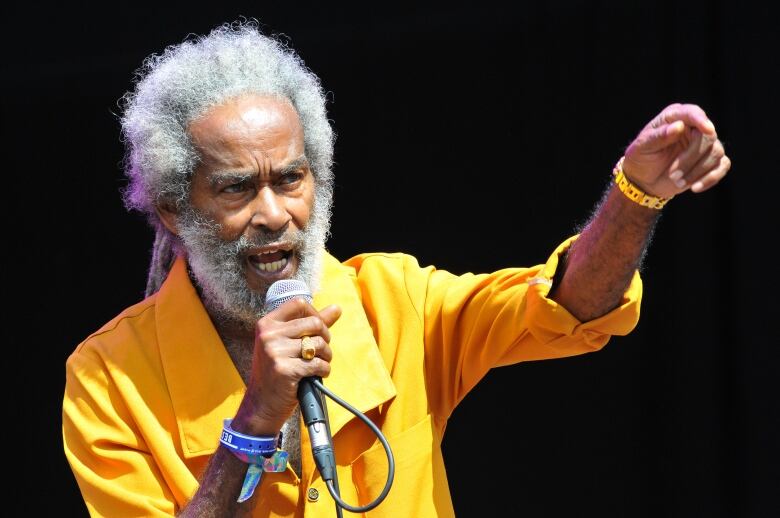Reggae icon Lee (Scratch) Perry was 'a genius in the true sense of the word,' says Max Romeo
Perry, a legendary producer and founding father of reggae, has died at the age of 85

Legendary musician and producer Lee (Scratch) Perry was a creative genius and an easygoing guy who saw the comedy in everything, says reggae star Max Romeo.
Perry, whose real name is Rainford Hugh Perry, died yesterday at a hospital in Montego Bay, Jamaica, according to a statement issued by Prime Minister Andrew Holness. He was 85.
A prolific producer, Perry was considered one of the founding fathers of reggae, and a pioneer of dub music in the 1970s.
In 2015, after a fire gutted his home study in Switzerland, he told As It Happens about all the love and support he received from fans and old friends all over the world.
Romeo worked with Perry on the 1976 album War Ina Babylon. Here is part of his conversation with As It Happens guest host Peter Armstrong.
It was so lovely to hear [Perry on As It Happens in 2015] talking about how, in spite of a lot of loss in the fire, how that incident allowed him to reconnect with fans and friends and all these people that really did love him so much.
Well, reggae is a beloved music across the globe, and Scratch is widely regarded as an icon, a genius in the true sense of the word because he knows how to make music.
And I loved to work with him as a producer, because I go with a set of lyrics and a melody and we sit together and construct the rhythms, along with the musicians.
He was more than just a producer. He was a creator of songs, working along with artists.
I read about that, that he wasn't afraid to get his hands dirty. He'd get in and he'd play and become a real integral part of the recording. What was that like, as the artist coming in, to produce something with him?
It was good because it makes it easier for the artist. Everything is not up to the artist.
He's not just an engineer on a board pushing buttons. You know, he is very active in the production.

He had a real knack, didn't he, in terms of the layering of so many rhythms and so many different kinds of sounds on top of one another in the studio? What did people make of that at the beginning when he was just starting out?
It was a struggle for all of us in the business, and well, he had a little craziness to it, and I think that was the trick because in order to be a good creator of music, you got to have a little craziness in you.
His music is crazy, man. It's crazy. Man, it's hard to explain, you know? It's a great loss.
I've heard so many stories about your track Chase the Devil, that he produced, and one version I've heard of is that you didn't like it. You were unhappy with that track. And he sort of took it, took the reins in terms of that recording. Tell me what happened with that song.
It's true. After we actually did the mix and he gave me a cassette to go and listen [to], when I got to that track, although I wrote the lyrics ... it just didn't fit in with what the rest of the song was about. You know, everything about it was different. So I told him I didn't like that track on the album.
He said: You're crazy, man …. It's the best on the album. You don't hear what you're saying.
And he was right. It's that track that sells the album.
It must take an incredible amount of trust and courage to hear him say that, and say: OK, boss, if you think so, let's do this.
Yeah, I'm talking to a genius.

You mentioned that the fire at the studio in Switzerland wasn't the only one. You talked about when the Black Ark, his studio in Jamaica, burned down in 1983. That was a particularly dark time for him. What do you remember about that and how he was doing then?
At the time I was on tour. So I came home to the news. But before I left, he was acting a little crazy. You know, he just slipped into a different dimension.
There were some guys around who he wanted to get rid of. And no matter what he tried, they were still around. So he decided to blow the studio up, you know. And that's what happened. Everybody went, but everything went with it.
And how did that hit him?
Like I said, nothing gives Scratch problems, you know. He's such an easygoing guy that everything to him is comedy.

Your stories about him paint this creative genius with wild ideas, wilder outfits, this huge personality. Was that huge personality, Lee (Scratch) Perry, the one that you knew, or was there a more private Lee that you got to know?
That's what I know. I don't know the private part. I mean, nobody knows the private part of Lee Perry. Everything's up front, actually.
He's obviously known for reggae and dub, but his music has also inspired so many artists who are talking about him today. What do you think he would make of the legacy that he's left?
Well, I would imagine that he would be sitting there enjoying every moment of it because he deserved it. And hey, everybody's saying good things because there's only good things to say, actually.
Written by Sheena Goodyear with files from The Associated Press. Interview produced by Sarah Jackson. Q&A has been edited for length and clarity.
